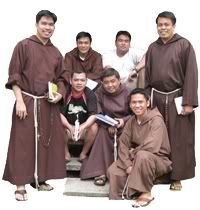It is a curious fact that although many pious and learned persons do not shrink from discouraging, in every possible way, aspirants to religious life, they would scruple to give them any help or encouragement. “A vocation must be entirely the work of the Holy Ghost,” they say. Willingly they paint the imaginary difficulties and trials of a convent life, and hint at the unhappiness sometimes to be found there; they speak of the long and serious deliberation necessary before one takes such a step, and thus, unintentionally perhaps, but most effectively extinguish the glowing enthusiasm of a youthful heart. Some even assume a terrible responsibility by deliberately turning away souls from the way into which the master is calling them, forgetting the warning: “It is I who have chosen you,” never reflecting on the irretrievable harm they are causing by spoiling the work of God. Others calmly assure a postulant, who has been found unsuitable for a particular Order, that this is a certain sign Almighty God does not want him, that he has no vocation and should not try again. It is quite true to say that a vocation comes from above, but God’s designs can be hindered or helped by His creatures, and He has ever made use of secondary agents in their execution. The formation of character and the direction of the steps of the young towards the Sanctuary is largely in the hands of parents and teachers; how many a happy priest and nun daily thank their Maker for the gift of a good mother, who first sowed the seeds of a vocation in their childish heart. Fathers and mothers constantly put before their children the various calling and professions of life to help them in the choice; is the grandest life of all, the service of the King of Kings, the battling for precious souls, and the extension of Christ’s Kingdom, to be ignored and never spoken of? The saints realized that God looked to them to aid Him in the work of fostering vocations. St. Jerome writes thus to Heliodorus: “I invite you, make haste. You have made light of my entreaties; perhaps you will listen to my reproaches. Effeminate soldier! What are you doing under the paternal roof? Hasten to enlist under the banner of Christ.” So eloquently did St. Bernard speak of the advantages of the religious life that all his brothers and thirty young nobles followed him to the solitude of Citeaux. More striking still was the bringing of the Apostles to Our Lord by indirect means. St. Andrew and St. John were sent to the Saviour by St. John the Baptist: “Behold the Lamb of God. And the two disciples heard him speak, and they followed Jesus.” “Andrew findeth first his brother Simon,.. and he brought him to Jesus.” “On the following day he [Andrew] would go forth into Galilee, and he findeth Philip… Philip findeth Nathaniel, and said to him: We have found Him of Whom the prophets did write… and Nathaniel said to him: Can any good come out of Nazareth? Philip said to him: Come and see,” with the result that he also received the call to follow Christ. Thus one by one the Apostles were brought to the knowledge of the Messias and under the influence of His grace, without which all human efforts are useless to produce a vocation. “Know well,” says St. Thomas, “that whether it be the suggestion of the devil or the advice of a man which inclined us to the religious life, and makes us thus walk in the footsteps of Jesus Christ, this suggestion or advice is powerless and inefficient so long as God does not attract us inwardly towards Him. Therefore, the proposal of entering into religion, in whatever way it may be suggested to us, can come only from God.” “No man can come to Me, unless it can be given him by My Father.” Hence the Saint adds, that even if the religious vocation came from devil, it ought to be embraced as an excellent counsel given by an enemy.
skip to main |
skip to sidebar

CAPUCHINO.
FRANCISCANO.
PILIPINO.
The Capuchin Friars Minor is a religious community of Priests and Brothers living in Gospel Brotherhood, Prayer and Contemplation, Minority, Simplicity and Joy! If you are at least 18 years old and at least a second year college/vocational student,
WE INVITE YOU TO JOIN US!
Board and lodging and tuition scholarships are offered to all accepted applicants.
CAPUCHIN VOCATION OFFICE
Sta Teresita del Nino Jesus Parish
43 Kanlaon St., Sta. Mesa Heights, Quezon City
(02) 731 5044, (02) 731 9227, 0917 815 8133
bokasyongcapuchino@gmail.com
capvoc@yahoo.com.ph
Archives
- vocation resources (19)
- vocation videos (3)
- religious orders (men) (2)
- vocation (2)
- definition of terms (1)
- franciscan family (1)
- information (1)
- message (1)
- pope (1)
- prayer (1)
- religious formation (1)
- world (1)
WHAT'S YOUR CALLING?
"You have not chosen me: but I have chosen you; and have appointed you, that you should go, and should bring forth fruit; and your fruit should remain."
(John 15:16)
(John 15:16)
Prayer to Follow Christ's Call
Lord, I thank you for the gifts you have given me, especially for life, love, family and friends. Help me to know myself better and my talents. As I pray, study and decide on my life's work, help me see and understand the path you open for me. Help me choose a life's work, which will be in response to my potential and your love. If I am invited to follow you as a Priest, a Monk or Nun, a Religious Brother or Sister, Missionary or Lay Consecrated, give me a generous heart to respond to your challenging call ang the strength to follow You whatever you lead me.
AMEN!
(Adopted from the Daugthers of Divine Zeal Philippine Delegation)
AMEN!
(Adopted from the Daugthers of Divine Zeal Philippine Delegation)
CBCP News
Catholic World News
BUHAY CAPUCHINO!

CAPUCHINO.
FRANCISCANO.
PILIPINO.
The Capuchin Friars Minor is a religious community of Priests and Brothers living in Gospel Brotherhood, Prayer and Contemplation, Minority, Simplicity and Joy! If you are at least 18 years old and at least a second year college/vocational student,
WE INVITE YOU TO JOIN US!
Board and lodging and tuition scholarships are offered to all accepted applicants.
CAPUCHIN VOCATION OFFICE
Sta Teresita del Nino Jesus Parish
43 Kanlaon St., Sta. Mesa Heights, Quezon City
(02) 731 5044, (02) 731 9227, 0917 815 8133
bokasyongcapuchino@gmail.com
capvoc@yahoo.com.ph







